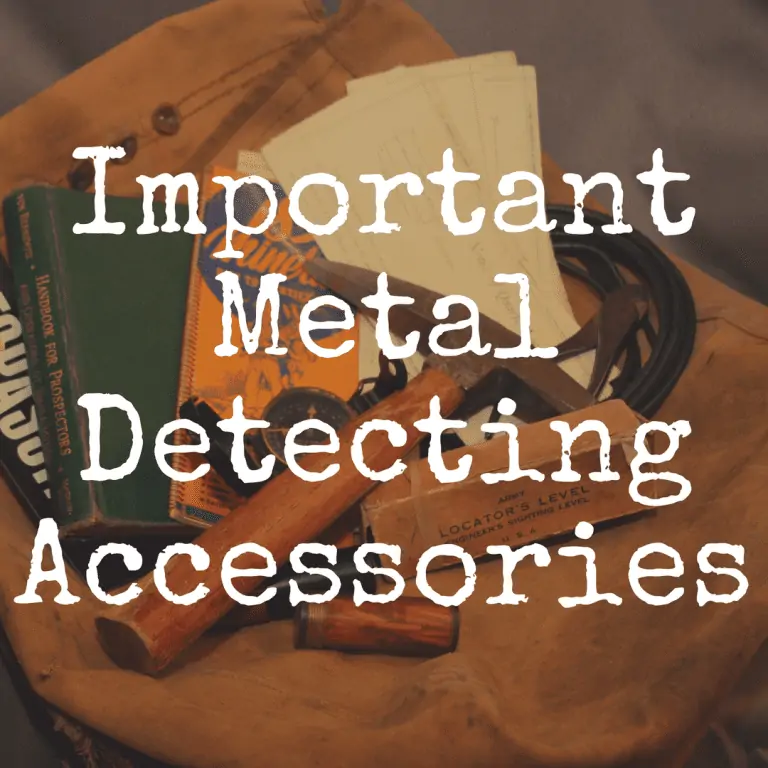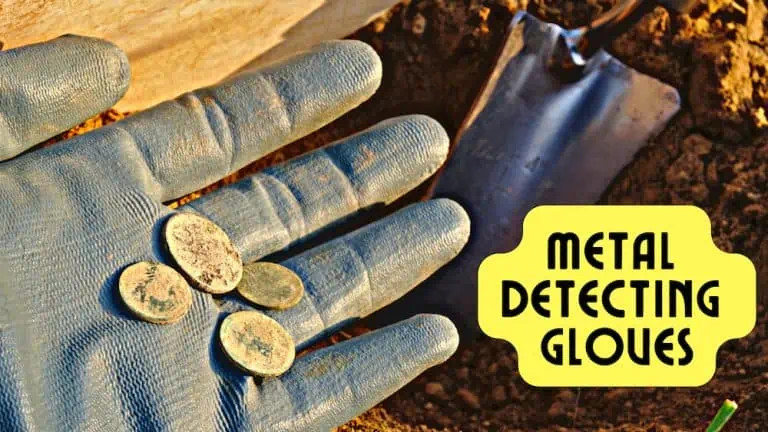10 Metal Detecting Tools to Find Gold and Silver You’ll Love
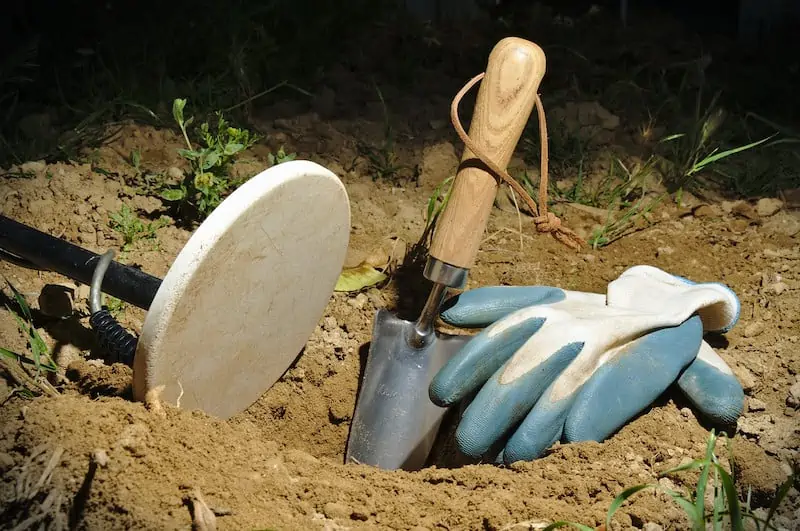
When you go metal detecting, you always need to make sure you’re carrying the right tools to search for and find the perfect treasure. So in this article, I’m going to provide you with a list of ten metal detecting tools you’ll absolutely want by your side if you’re hunting for gold or silver.
The Best Metal Detecting Tools
Okay, let’s kick off this list with the absolute most obvious tool you need—an excellent metal detector.
Pinpointer
A handheld metal detector, also called a pinpointer, is a great tool for any detectorist searching for gold, silver, jewelry, or relics. These smaller metal detectors are meant to zero in on a target location allowing you to easily find the item without digging so much. These can also help you not damage your target with your shovel because you can better determine where the item is and use a smaller digging implement or even your fingers to retrieve the item.
Some of the best pinpointers on the market are made by Garrett, with my favorite being the Pro-Pointer AT. This model is fully waterproof up to 20 feet, vibrates upon detection, and has a small light to illuminate your search area. This model is very sensitive and accurate.
- You Might Enjoy: The Best Metal Detecting Pinpointers
Metal Test Kit
One of the best tools you can have in your metal detecting arsenal if you are searching for gold and silver is a metal test kit. These kits are a series of acids that you put on the metal and the color indicates the type of metal you have found.
The reason this is so important is many metals look so similar. You may find a ring or necklace that looks just like gold, but it tests as brass. You may think you have found gold ore, only to find out it is fool’s gold. You make think you have found silver only to find out you have found platinum (wouldn’t that be amazing?!). A test kit is an effective way to ensure you know what you are finding.
Metal Detecting Pouch
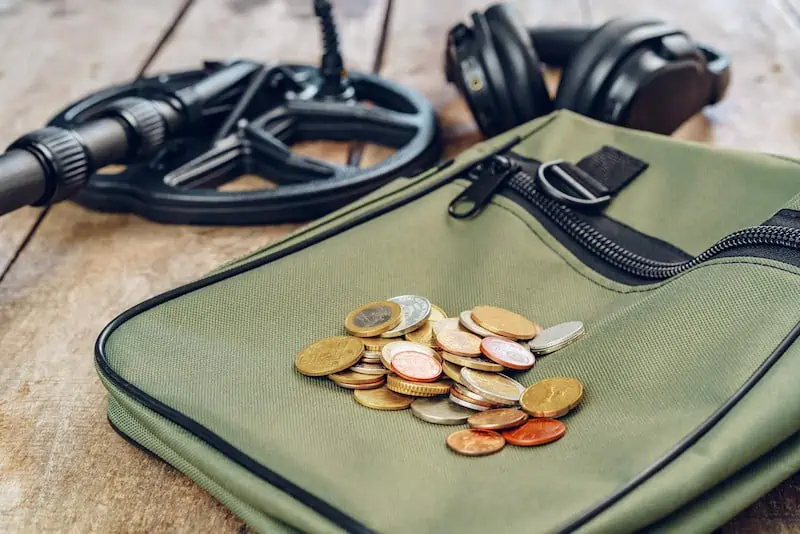
A metal detecting finds pouch is an important, and often overlooked, metal detecting item. These pouches are typically hip mounted, onto a belt or with a built-on belt, so they are conveniently strapped to your side. These make it simple to deposit any item you find into them for safe keeping. This is much simpler than having to open a backpack or other bag to place your items inside.
You can drop it in your hip mounted finds pouch and continue detecting. There are many types and brands of finds pouches on the market, so do a little research to see which type fits your needs the best.
Gold Storage
If you are looking for gold, specifically gold nuggets, you will want a small vial or jar to store the nuggets inside. Most gold nuggets found today are small, so you do not want to place them inside a large pouch, or they may become lost or stuck in the threads at the bottom of the pouch. A small glass vial, or even a plastic container like an old pill bottle, is a terrific way to safely store your gold nuggets.
For gold flakes, you will want a snifter. These are small plastic bottles with a straw sticking out of them. You put a small amount of water in the bottom, squeeze the jar upside down over the flakes of gold, and suck them through the straw into the water. The straw comes with a cap to keep the water and gold flakes inside.
Metal Detecting Tools for the Beach
Let’s now talk about a few metal detecting essentials when you’re searching for treasure on the beach.
Sand Scoop
When you are metal detecting on the beach, a sand scoop is your new best friend! Digging a hole in sand with a traditional shovel is no easy task. Sand grains tend to fall in upon themselves, refilling the hole as quickly as you can dig it out. A sand scoop is like a sifter.
You scoop sand into the shovel and gently shake. The scoop itself is full of dozens of holes allowing the sand to filter out, leaving your target behind inside the scoop. These scoops are lifesavers when metal detecting in sandy beach areas!
Waterproof Search Coil
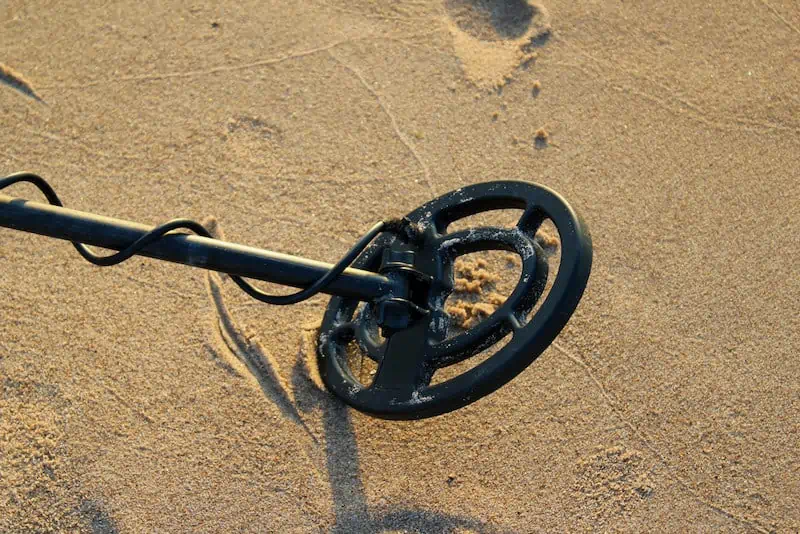
When metal detecting on a beach, you will want to ensure your metal detector has a waterproof search coil. Ideally, you want your entire metal detector to be waterproof, so you do not have to worry about accidentally dropping it in the water.
But at the very least, you want your search coil to be waterproof. Many metal detectors come with waterproof search coils. These can typically be submerged up to the control box. Waterproof search coils are one of the best tools needed for metal detecting.
Headphones
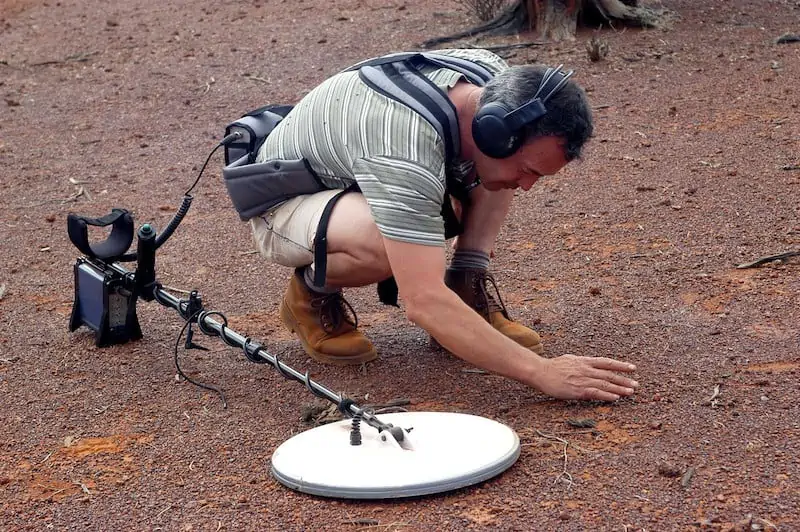
Metal detecting headphones are not always necessary, but they do come in handy. When you use headphones while metal detecting, whether it be on a beach or in any other setting, it makes it much easier to block out the outside world and concentrate more on the sounds your metal detector is emitting. Headphones make it much easier to hear faint signals.
You may miss these faint signals if you do not use headphones, and they just may be a valuable target buried deeply or obscured by another piece of metal. Sometimes a good target will be masked by a trashy target, and with headphones you can hear both targets instead of the dominant trashy target. You would hate to pass up a target that reads as iron, when just to the side of the iron target is a diamond ring!
Metal Detecting Shovel
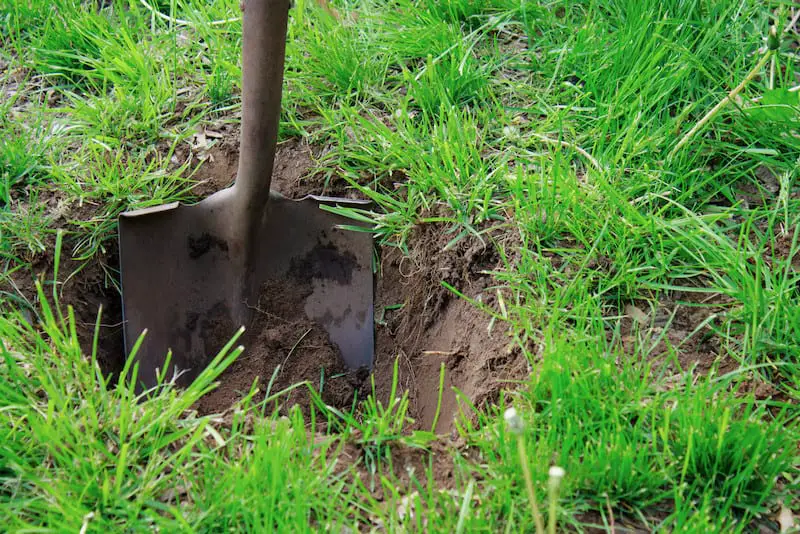
High quality digging tools are something no metal detectorist should be without. You may be thinking a shovel is a shovel, right?
Well, not necessarily.
While you can always use a traditional shovel that you would use for yardwork or other manual labor tasks, there are many options on the metal detecting market that make digging for treasure easier and more efficient. I always recommend a decent quality metal detecting shovel and a good quality hand trowel or cutting tool. Some areas have restrictions on digging implements, so ensure you know the laws and rules regarding digging before you head out.
Grave Digger makes a T-Handle shovel that is perfect for digging for treasure. This shovel is pointed at the end and has teeth up both sides allowing it to cut through the earth easier. This shovel easily cuts through soil, no matter how compact it is, easily. I live in an area with high clay content, so it is almost rock hard in some areas, and this shovel makes digging so much easier. The pointed end and teeth, along with the large area to apply pressure from the foot makes it much nicer to use than a standard smooth sided shovel. It is nice to expend less energy digging so you can use more energy detecting and finding treasure.
One of the best hand tools out there is the Lesche LS Digging Cutting Tool. This trowel is pointed at the end with teeth on one side. Much like the shovel, it makes digging through tough soils much easier. The less energy you can spend digging the more energy you will have to hunt for treasure!
Metal Detecting Cleaning Kit
You should always exercise caution when cleaning metal detecting finds. Many finds can be damaged easily because they have been in the ground for so long and are delicate. You can build your own cleaning kit easily with simple items that will ensure your finds remain safe and undamaged. The first item I recommend is a small spray bottle of plain water.
Water is the best thing to use when cleaning an item, you have found. It will not damage the item like acids or abrasive cleaners. You can pour water over the item or let the item soak in water once you get home. The longer the item soaks the more dirt and grime will be removed.
A soft, clean microfiber cloth is another good item to put in your metal detecting cleaning kit. These towels are incredibly soft and can help remove stubborn dirt and grit. Be careful when using these so as not to damage the item. Never use a microfiber cloth dry. Use it when the item and the cloth are both wet to prevent damage to the treasure.
Gently rub the wet cloth in one direction over the item. Do not reuse the same section of the cloth on the item again, as you can smear the dirt and grime back over the item which can cause damage. Rinse well with water, and always wash your microfiber cloths before using again.
You can use very soft bristle brushes to clean items you find. It is best to use brushes with natural bristles, like a Japanese hake brush made from sheep hair. These types of brushes are often used on relics found in the archeological world, so they are typically safe for most applications. If you are not terribly worried about harming the items you find, meaning you do not wish to sell them, you can use a fine synthetic bristle brush to remove dirt and debris from the items.
Both types of brushes can get into the cracks and crevices to remove build up easily. Be aware that synthetic brushes have a greater chance to damage coin surfaces, even if you cannot see the damage. Silver and gold are both soft metals and can easily be damaged. If you plan to have the coin valued, the assayer will be able to see this damage under a microscope.
For more stubborn items, you can always use cleaning acids like vinegar to remove stains, oxidation, and soil. These can damage the items, so be sure you take care when using abrasive cleaners. When cleaning gold jewelry, I like to use a solution of dish soap and water. Simply soak the jewelry in the soap and water mixture, and rinse. It is amazing how much this solution will remove! I use this to clean my own gold jewelry and it does not cause any damage.
As a last resort, you can always have a professional clean any coins or jewelry you find while metal detecting. These professionals know how to clean these items without causing damage to them. If you are willing to pay for the cleaning cost, it may be worth it, especially if you plan to sell the items.
- You Might Also Like: How to Clean Wheat Pennies
Compass or Smartphone
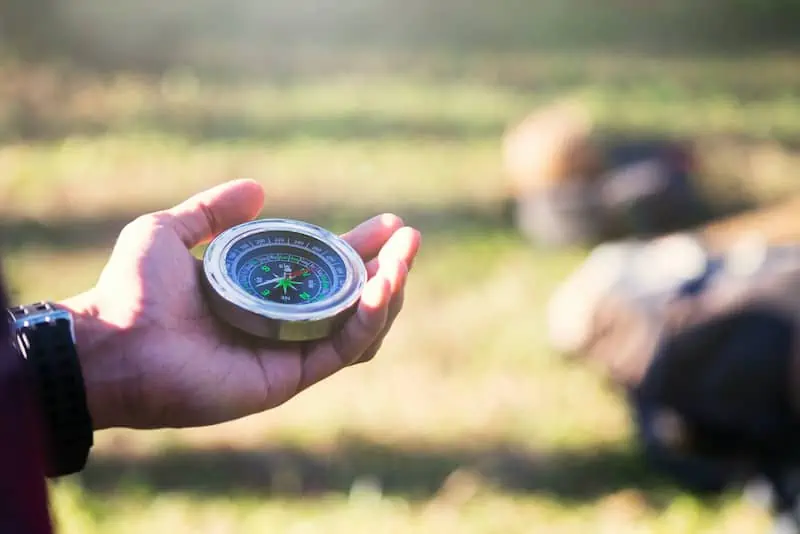
Depending on how deep into the woods you decide to venture, or how far off on a farm or ghost town you want to wander, it’s always important to know how to get back to your car or home.
But what if you get a little turned around? What happens when you lose your bearings and find yourself lost?
That’s when you’re going to want to make sure you bring a compass with you. Whenever you venture out to some of the best places to metal detect, it’s easy to get enamored with the beauty of the location or the excitement about your upcoming metal detecting finds. But, remember that getting there is just half of the work–you always gotta know how to get back.
So, in this case, if you want to enjoy the metal detecting hobby the old school way–then just bring an old school compass (and know how to use it!). And, if you want to step into the modern age, make sure you pack with you a cell phone (fully charged). I would still recommend that you bring a backup old school compass with you regardless, because you never know what could happen (such as your phone dying, breaking, or is simply unable to receive cell reception).
How to Find Right Metal Detector
When you are searching for precious metals, the right metal detector makes all the difference. All metal detectors will find metal, whether they cost $60 or $2,000. However, not all metal detectors are created equal. Metal detector manufacturers go to great lengths to create detectors for specific treasure types and for specific environments. When you are searching for silver, you want a metal detector that operates at a lower frequency. Silver is highly conductive, and most metal detectors will easily find silver due to its high conductivity.
Gold, on the other hand, is best found at frequencies above 18 kHz. Most inexpensive metal detectors operate around 6 -12 kHz. There are numerous options on the market for gold specific metal detectors. Most areas where gold is found have high soil mineralization, hot rocks, and black sands. These can all have negative impacts on a traditional metal detector.
Gold specific metal detectors have technology to battle these naturally occurring minerals and alert to gold, rather than giving false signals. One of the best on the market is the Fisher Gold Bug 2. This metal detector operates at a whopping 71 kHz, meaning it can find even the smallest and finest gold out there.
Along with the proper metal detector for the job, understanding how to use the settings on your metal detector are equally important. Take some time to familiarize yourself with the manual and try some test searches at home to see how your detector reacts to silver and gold items.
- You Might Enjoy: The Best Fisher Metal Detector
Conclusion
When searching for precious metals like silver and gold, it is not quite as straightforward as turning on your metal detector and going. You will find metal with this process, but there are intricacies to finding precious metals. And the reality is that, when you’re seeking treasure buried under soil or sand, you’re going to need helpful metal detecting tools by your side.
Gold fields tend to have a lot of mineralization, hot rocks, and black sands, which all wreak havoc on a traditional metal detector. Most metal detectors will give false readings or even overload in these scenarios. Having a metal detector for gold prospecting is a great option because they are built to ignore these factors and give more true gold signals. Metal detectors with a frequency higher than 18 kHz are the best for finding gold, but the higher the frequency the smaller and finer the gold it can find.
Silver, on the other hand, is found at the lower end of the frequency spectrum. It is much more conductive than gold so even the lowest frequency metal detector can find silver. You may also be looking for silver or gold jewelry, which you are more likely to find than ore. These are likely to be found in areas where people frequent like recreation areas. Beaches, parks, hiking trails, and campsites are all great places to search with your metal detector for gold and silver items.
Along with the items mentioned in this article, always make sure you take along plenty of batteries (if your metal detector uses traditional batteries), a sack to pack out trash, gloves to protect your hands, plenty of water, and a backpack. You may also want a chest or hip mounted harness if your metal detector is on the heavy side. These make it much easier to metal detect for prolonged periods of time by distributing the weight to your body instead of your arm.
While the items on this list may not seem necessary to find silver and gold, they can make your metal detecting trip more efficient and successful. This is the goal of any metal detecting trip. Greater efficiency means you can metal detect more and longer. This makes your odds of success much higher.
- If you enjoyed this article, please “like” our Facebook page!
You Might Also Like:


